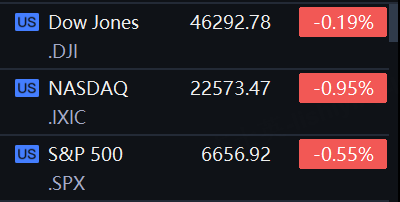Post-Bell | U.S. Stocks End Lower; TSMC Jumps 4%; Tesla Falls 2%; Nvidia and Amazon Drops 3%; Oracle Sinks 4%

U.S. stocks finished lower on Tuesday, breaking a three-session string of record closing highs, as Federal Reserve Chair Jerome Powell said the U.S. central bank needs to balance inflation concerns with a weakening job market in its coming interest rate decisions.
Market Snapshot
The Dow Jones Industrial Average fell 88.76 points, or 0.19%, to 46,292.78, the S&P 500 lost 36.83 points, or 0.55%, to 6,656.92 and the Nasdaq Composite lost 215.50 points, or 0.95%, to 22,573.47.

Market Movers
Nvidia - Nvidia fell 2.8% after rising 3.9% on Monday to close at a record high of $183.61. The chip maker announced it was planning to invest as much as $100 billion in OpenAI, the maker of ChatGPT, to support the buildout of AI data center capacity. The partnership will deploy at least 10 gigawatts of Nvidia AI systems to train and run OpenAI’s next-generation AI models. Rival Broadcom was flat following a 1.6% drop on Monday.
Tesla - Tesla shares dropped 1.9%. The shares jumped 1.9% on Monday.
Apple - Apple was down 0.6%. Shares of the iPhone maker closed Monday’s session up 4.3%. Apple has gained just 1.6% this year, lagging behind its Magnificent Seven peers. Wedbush analyst Dan Ives said he expects a rebound in the stock as users upgrade to the iPhone 17, adding that Wall Street was “clearly underestimating this iPhone cycle,” as heraised his price targeton shares to $310 from $270.
Amazon - The e-commerce company said it aimed to close its brick-and-mortar Amazon Fresh U.K. stores. The stock closed down just over 3% on Tuesday.
TSMC - Shares of TSMC, which makes Nvidia-designed chips, jumped 3.7% in New York. On Monday, Nvidia said it would invest up to $100 billion in OpenAI to fund a data-center build-out.
Oracle - Oracle stock fell 4.4% as investors rethink their enthusiasm for the longtime database software company that's turned into a red-hot play on AI through its relationship with OpenAI.
Boeing - Boeing rose 2% after Trump said the plane maker received an order from Uzbekistan Airwaysworth more than $8 billion. Meanwhile, David Perdue, the U.S. ambassador to China, said the U.S. and Beijing were finishing negotiations for a “huge order,” though he declined to share details.
CoreWeave - CoreWeave was down 1.8% at $130.89. Analysts at Melius Research upgraded shares of the AI cloud-computing company to Buy from Hold and Wells Fargo upgraded CoreWeave to Overweight from Equal Weight and boosted the price target to $170 from $105.
Kenvue - Tylenol-maker Kenvue was up 1.6%. The stock sank to a record low Monday after President Donald Trumpclaimed autism in children was linked to use of the drugin pregnancy. There is a “lack of new scientific evidence” to support Trump’s claims, said Citi analysts in a research note. Kenvue, in an emailed statement, said “sound science clearly shows that taking acetaminophen does not cause autism.”
Firefly Aerospace - Firefly Aerospace fell 15.3% after the rocket developer posted its first earnings report since becoming a public company. Second-quarter revenue of $15.5 million fell from $21.1 million a year earlier and missed analysts’ expectations of $16.8 million. The company’s second-quarter loss widened to $5.78 a share from a loss of $4.60 a year earlier.
Plug Power - Plug Power, the hydrogen technology provider, was down 4.5% after jumping nearly 22% on Monday. The stock had closed higher for nine consecutive sessions and had risen 88% over the span, according to Dow Jones Market Data.
Vistra Energy - Shares of power company Vistra tumbled 6.3% to $204.24. Analysts at Jefferies downgraded Vistra to Hold from Buy and reduced their price to $230 from $241, citing a lack of clarity around a potential hyperscaler deal for Vistra’s Comanche Peak nuclear plant. The stock notched record intraday and closing highs on Monday.
Halliburton, Baker Hughes - Oil-service stocks Halliburton and Baker Hughes rose 7.3% and 2.6%, respectively, as West Texas intermediate crude oil, the U.S. benchmark, gained nearly 2%.
Micron Technology - Micron Technology was up 1.1% ahead of its fiscal fourth-quarter earnings report after the closing bell Tuesday. The memory chip maker was expected to post adjusted earnings of $2.86 a share in the period on revenue of $11.2 billion. Shares have gained nearly 98% this year.
Market News
Fed's Powell Strikes Middle Path on Inflation, Jobs, as Others Take Sides
U.S. Federal Reserve Chair Jerome Powell said on Tuesday the central bank needed to continue balancing the competing risks of high inflation and a weakening job market in coming interest rate decisions, even as his colleagues staked out arguments on both sides of the policy divide.
"Near-term risks to inflation are tilted to the upside and risks to employment to the downside - a challenging situation," Powell said in remarks that stuck close to language used last week when the central bank cut its benchmark rate a quarter of a percentage point. The current rate, in the range of 4% to 4.25%, is still considered high enough to lean against price pressures in the economy, but "leaves us well positioned to respond to potential economic developments. Our policy is not on a preset course," Powell said.
While that phrase is something of a mantra for central bankers, it has taken on particular resonance now, with strong opinions emerging on both side of the policy divide.
Micron Forecasts First-Quarter Revenue Above Estimates on AI Demand
Micron Technology forecast first-quarter revenue above market estimates on Tuesday, betting on booming demand for artificial intelligence hardware to boost sales of its advanced memory chips as a race to dominate AI tech intensifies.
Efforts to build the most sophisticated AI models and expand the data center infrastructure that they run on have boosted demand for Micron's high-bandwidth memory chips, or HBM.
Much of the competition among the world's largest memory suppliers — Micron, SK Hynix and Samsung — has centered on becoming a key HBM supplier to Nvidia, owing to the world's most valuable company's dominant market position.







